2003 年福建高考英语真题及答案
第一部分:听力(共两节,满分 30 分)
第一节(共 5 小题:每小题 1.5 分,满分 7.5 分)
1.What is the man going to do?
A.Open the window.
B.Find another room.
C.Go out with the woman.
2.What do we know about Peter Schmidt?
A.He has lost his ticket.
B.He is expecting a ticket.
C . He
went out to buy a ticket.
3.What do we know about mother and son?
A.She wants to tell him the
result of the game.
B.She doesn’t like him to watch TV.
C.She knows which team he supports.
4.What are the speakers talking about?
A.Exam results.
B.Time for the exam.
C.Change of class hours.
5.What will the woman tell the man?
A.Her company’s name. B.Her new address.
C.Her phone number.
第二节(共 15 小题:每小题 1.5 分,满分 22.5 分)
6.What is the possible relationship between the woman and the man?
A.Wife and husband.
B.Doctor and patient. C.Boss and secretary
7.What does the woman think about the man?
A.He is not good to the children.
B.He is not telling the truth.
C.He sleeps too much.
8.Where does the woman want to go?
A.An office.
B.A fruit shop.
C.A police station.
9.What does the woman have to do now?
A.Wait for Mark at the crossroads.
B.Walk ahead and turn right.
C.Walk a little way back.
10.What exactly does the man want to find out?
A.What people think of the bus service.
B.How many people are using the bus service.
C.Which group of people use the bus service most often.
11.What does the woman say about the bus service?
A.The distance between bus stops is too long.
B.The bus timetables are full of mistakes.
C.Buses are often not on time.
�
12.Why does the woman say her husband is fortunate?
A.He often goes to work in a friend’s car.
B.He doesn’t need to go shopping by bus.
C.He lives close to the bus station.
13.What is the probable relationship between the two speakers?
A.Salesperson and customer
B.Old school friends
C.Fellow workers
14.What do we know about the woman?
A.She is fond of her work.
B.She is tired of traveling.
C.She is
interested in law.
15.What is the man?
A.A company manager.
B.A salesperson.
C.A lawyer.
16.Why does the woman ask for the man’s address?
A.To send him a book.
B.To get together with him.
C.To repair something at his home.
17.What is the aim of the program?
A.To keep trainees in shape.
B.To improve public relations.
C.To develop leadership skills.
18.Which of the following will the trainess be doing during the program?
A.Attenling lectures on management
B.Preparing reports for the company.
C.Making plans for a journey.
19.How long will the program last?
A.8 days
B.12 days
C.20 days.
20.If people want to join the program, what should they do after the meeting?
A.Take a pre-test
B.Pay for the program.
C.Sign on a piece of paper.
第二部分:英语知识运用(共两节,满分 45 分)
第一节:单项填空(共 15 小题:每小题 1 分,满分 15 分)
21.Don’t be afraid of asking for help
it is needed.
A.unless
B.since
C.although
D.when
22.A cook will be immediately fired if he is found
in the kitchen.
A.smoke
B.smoking
C.to smoke
D.smoked
23.Allen had to call a taxi because the box was
to carry all the way home.
A.much too heavy B.too much heavy C.heavy too much D.too heavy much
24.—Sorry, Joe, I didn’t mean to…
�
—Don’t call me “Joe”. I’m Mr Parker to you, and
you forget it!
A.do
B.didn’t
C.did
D.don’t
25.If anybody calls, tell them I’m out, and ask them to
their name and address.
A.pass
B.write
C.take
D.leave
26.The sign reads “In case of
fire, break the glass and push
red
button.”
A.不填;a
B.不填;the
C.the; the
D.a;a
27.All morning as she waited for the medical report from the doctor, her nervouseness
.
A.has grown
B.is growing
C.grew
D.had grown
28.A left luggage office is a place where bags
be left for a short time, especially
at a railway station.
A.should
B.can
C.must
D.will
29.We’re going to the bookstore in John’s car. You can come with us
you can meet
us there later.
A.but
B.and
C.or
D.then
30.Why don’t you put the meat in the fridge? It will
fresh for several days.
A.be stayed
B.stay
C.be staying
D.have stayed
31.News reports say peace talks between the two countries
with no agreement reached.
A.have broken down B.have broken out
C.have broken in D.have broken up
32.—There’s coffee and tea: you can have
.
—Thanks.
A.either
B.each
C.one
D.it
33.—Susan, go and join your sister cleaning the yard.
—Why
A.him
? John is sitting there doing nothing.
B.he
C.I
D.me
34.The old couple have been married for 40 years and never once
with each other.
A.they had quarreled
B.they have quarreled
C.have they quarreled
D.had they quarreled
35.—I think you should phone Jenny and say sorry to her.
—
.It was her fault.
A.No way
B.Not possible
C.No chance
D.Not at all
第二节:完形填空(共 20 小题:每小题 1.5 分,满分 30 分)
阅读下面短文,掌握其大意,然后从 36—55 各题所给的四个选项(A、B、C 和 D)中,选出最佳选项。
I played a racquetball game against my cousin Ed last week. It was one of the most
36
and
tiring games I’ve ever had. When Ed first phoned and
37
we play, I laughed quietly, figuring
on an
38
victory. After all, Ed’s idea of
39
has always been nothing more
40
than
lifting a fork to his mouth.
41
I can remember, Ed’s been the least physically fit member
in the family. and
42
proud of himself. His big stomach has always ballooned out between
�
his T-shirt and trousers. Although the family often
43
about that. I’d refused to buy a
44
T-shirt or to lose weight. So when Ed
45
for our game not only with the bottom of his
shirt gathered inside his trousers but also with a stomach you could hardly
46
. I was so
surprised that I was
47
. My cousin must have made an effort to get himself into shape.
48
, at the point in our game when I’d have predicted(预计) the score to be about 9 to 1
in my favor, it was
49
7 to 9 — and Ed was
50
. The sudden realization was painful.
We
51
to play like two mad men. When the score was 16 up. I was having serious
52
about
staying alive until 21 years old. Let alone
53
that many points. When the game finally
ended,both of us were lying flat on our backs, too tired to
54
. In a way, I think we both
won: I the game, but cousin Ed my
55
.
36.A.encouraging
B.hopeless
C.surprising
D.regular
37.A.declared
B.mentioned
C.persuaded
D.suggested
38.A.unforgettable
B.unexpected
C.easy
39.A.exercise
B.preparation
C.joy
D.early
D.fitness
40.A.time-saving
B.comfortable
C.suitable
D.effort-making
41.A.As soon as
B.As long as
C.When
D.Since
42.A.strangely
B.personally
C.reasonably
D.eagerly
43.A.cared
44.A.clean
B.forgot
B.larger
C.quarreled
D.joked
C.straight
D.darker
45.A.set out
B.got ready
C.arrived
D.returned
46.A.notice
B.admire
C.believe
D.measure
47.A.nervous
B.curious
C.careless
D.speechless
48.A.After all
B.As a result
C.Above all
D.At last
49.A.mistakenly
B.then
50.A.leading
B.coming
C.instead
C.waiting
D.naturally
D.counting
51.A.pretended
B.stopped
C.continued
D.decided
52.A.thoughts
B.doubts
C.situations
D.problems
53.A.scoring
B.completing
C.receiving
D.keeping
54.A.play
B.start
C.sleep
55.A.friendship
B.respect
C.support
D.move
D.favor
第三部分:阅读理解(共 20 小题;每小题 2 分,满分 40 分)
阅读下列短文,从每题所给的四个选项(A、B、C 和 D)中,选出最佳选项,并在答题卡上将该项涂
黑。
A
Tristan da Cunha, a 38-square-mile island, is the farthest inhabited island in the
world,according to the Guinness Book Records, It is 1,510 miles southwest of its nearest neighbor.
St. Helena. And 1,950 miles west of Africa. Discovered by the Portuguese admiral(葡萄牙海军
上将) of the same name in 1506. and settled in 1810, the island belongs to Great Britain and
�
has a population of a few hundred.
Coming in a close second- and often wrongly mentioned is the most distant and—is Easter
Island, which lies 1,260 miles east of its nearest neighbor. Pitcairn Island, and 2,300 miles
west of South America.
The mountainous 64-square-mile island was settled around the 5th century, supposedly by
people who were lost at sea. They had no connection with the outside world for more than a thousand
years, giving them plenty of time to build more than 1,000 huge stone figures, called moat, for
which the island is most famous.
On Easter Sunday, 1722. however, settlers from Holland moved in and gave the island its name.
Today, 2,000 people live on the Chilean territory(智力领土). They share one street, a small
airport and a few hours of television per day.
56.It can be learned from the text that the island of Tristan da Cunha
.
A.was named after its discoverer
B.got its name from Holland settlers
C.was named by the British government
D.got its name from the Guinness Book of Records
57.Which of the following is most famons for moat?
A.Tristan da Cunha.
C.Easter Island.
D.St. Helena.
B.Pitcairn Island.
58.Which country does Easter Island belong to?
A.Britain.
B.Holland.
C.Portugal.
D.Chile.
B
Reading to dogs is an unusual way to help children improve their literacy skills(读写能
力), With their shining brown eyes, wagging tails, and unconditional love, dogs can provide
the nonjudg-mental listeners needed for a beginning reader to gain confidence(自信心), according
to Intermountain Therapv Animals (ITA) in Salt Lake City. The group says it is the first program
in the country to use dogs to help develop literacy in children, with the introduction of Reading
Education Assistance Dogs (READ).
The Salt Lake City Public Library is sold on the idea. “Literacy specialists admit that
children who read below the level of their fellow pupils are often afraid of reading aloud in
a group, often have lower self-respect, and regard-reading as a headache.” said Lisa Myton,
manager of the children’s department.
Last November the two groups started “Dog Day Afternoon” in the children’s department
of the main library. About 25 children attended each of the four Saturday-afternoon classes,
reading for half an hour. Those who attended three of the four classes received a “pawgraphed”
book at the last class.
The program was so successful that the library plans to repeat it in April. According to
Dana Thumpowsky, public relations manager.
�
59.What is mainly discussed in the text?
A.Children’s reading difficulties.
B.Advantages of raising dogs.
C.Service in a public library.
D.A special reading program.
60.Specialists use dogs to listen to children reading because they think ________.
A.dogs are young children’s best friends
B.children can play with dogs while reading
C.dogs can provide encouragement for shy children
D.children and dogs understand each other
61.By saying “The Salt Lake City Public Library is sold on the idea,” the writer means the
library
____________.
A.uses dogs to attract children
B.accepts the idea put forward by ITA
C.has opened a children’s department
D.has decided to train some dogs
62.A “pawgraphed” book is most probably _________.
A.a book used in Saturday classes B.a book written by the children
C.a prize for the children
D.a gift from parents
C
Tales From Animal Hospital
David Gram
David Gram has become a familiar face to millions of fans of AnimalHospital. Here Dr Gram tells
us the very best of his personal stories about the animals he has treated, including familiar
patients such as the dogs Snowy and Duchess, the delightful cat Marigold Serendipity Diamond.
He also takes the reader behind the scenes at Harmsworth Memorial Animal Hospital as he describes
his day, from ordinary medical check-ups to surgery(外科手术). Tales From Animal Hospital will
delight all fans of the programme and anyone who has a lively interest in their pet, whether
it be cat, dog or snake!
£14.99 Hardback 272pp Simon Schuster
ISBN 0751304417
Lsaac Newton: The Last sorcerer
Michael White
From the author of Stephen Hawking: A Life in Science, comes this colourful description of the
life of the world’s first modern scientist. Interesting yet based on fact. Michael White’s
learned yet readable new book offers a true picture of Newton completely different from what
people commonly know about him. Newton is shown as a gifted scientist with very human weaknesses
who stood at the point in history where magic(魔术) ended and science began.
£18.99 Hardback 320pp Fourth Estate
�
ISBN
1857024168
Fermat’s Last Theorem
Simon Singh
In 1963 a schoolboy called. Andrew Wiles reading in his school library came across the world’
s greatest mathematical problem: Fermat’s Last Theorem(定理). First put forward by the French
mathematician Pierre de Fermat in the seventeenth century, the theorem had baffled and beaten
the finest mathematical minds, including a French woman scientist who made a major advance in
working out the problem, and who had to dress like a man in order to be able to study at the
Ecole Polytechnique. Through unbelievable determination Andrew Wiles finally worked out the
problem in 1995. An unusual story of human effort over three centuries, Fermat’sLastTheorem
will delight specialists and general readers alike.
£12.99 Hardback 384pp Fourth Estate
ISBN 1857025210
63.What is Animal Hospital?
A.A news story.
B.A popular book.
C.A research report.
D.A TV programme.
64.In Michael White’s book, Newton is described as _________.
A.a person who did not look the same as in many pictures
B.a person who lived a colourful and meaningful life
C.a great but not perfect man
D.an old-time magician
65.Which of the following best explains the meaning of the word “baffle” as it is used in
the text?
A.To encourage people-to raise questions.
B.To cause difficulty in understanding.
C.To provide a person with an explanation.
D.To limit people’s imagination.
66.The person who finally proved Fermat’s Last Theorem is _____________.
A.Simon Singh
C.Pierre de Fermat
B.Andrew Wiles
67.What is the purpose of writing these three texts?
D.a French woman scientist
A.To make the books easier to read.
B.To show the importance of science.
C.To introduce new authors.
D.To sell the books.
There is one foreign product the Japanese are buying faster than others and its popularity
D
has caused an uneasy feeling among many Japanese.
That product is foreign words.
Gairaigo – words that come from outside-have been part of the Japanese language for
�
centuries. Mostly borrowed from English and Chinese, these terms are often changed into forms
no longer understood by native speakers.
But in the last few years the trickle(涓涓细流) of foreign words has become a flood, and
people fear the increasing use of foreign words is making it hard for the Japanese to understand
each other and could lead to many people forgetting the good qualities of traditional(传统的)
Japanese.
“The popularity of foreign words is part of the Japanese interest in anything new.” says
university lecturer and writer Takashi Saito. “By using a foreign word you can make a subject
seem new, which makes it easier for the media(媒体) to pick up.”
“Experts(专家) often study abroad and use English terms when they speak with people in their
own fields. Those terms are then included in government white papers.” said Muturo Kai, president
of the National Language Research Institute. “ Foreign words find their way easily into
announcements made to the general public, when they should really be explained in Japanese.”
Against the flow of new words, many Japanese are turning back to the study of their own language.
Saito’s JapanesetoBeReadAloudis one of many language books that are now flying off booksellers’
shelves.
“We were expecting to sell the books to young people.” said the writer. “but it turns
out they are more popular with the older generation, who seem uneasy about the future of Japanese.”
68.What advantages do foreign words have over traditional Japanese terms.
A.The ideas expressed in foreign words sound new.
B.Foreign words are best suited for announcements.
C.Foreign words make new subjects easier to understand.
D.The use of foreign words makes the media more popular.
69.In the opinion of Takashi Saito. Japanese people ________________.
A.are good at learning foreign languages
B.are willing to learn about new
things
C.trust the media
D.respect experts
70.Which of the following plays an important part in the spread of foreign words?
A.The media and government papers. B.Best-selling Japanese textbooks.
C.The interest of young Japanese.
D.Foreign products and experts.
71.The book Japanese to Be Read Aloud __________.
A.sells very well in Japan
B.is supported by the government
C.is questioned by the old generation
D.causes misunderstanding among the
readers
E
At one time, computers were expected largely to remove the need for paper copies of
documents(文件) because they could be stored electronically. But for all the texts that are
written, stored and sent electronically, a lot of them are still ending up on paper.
�
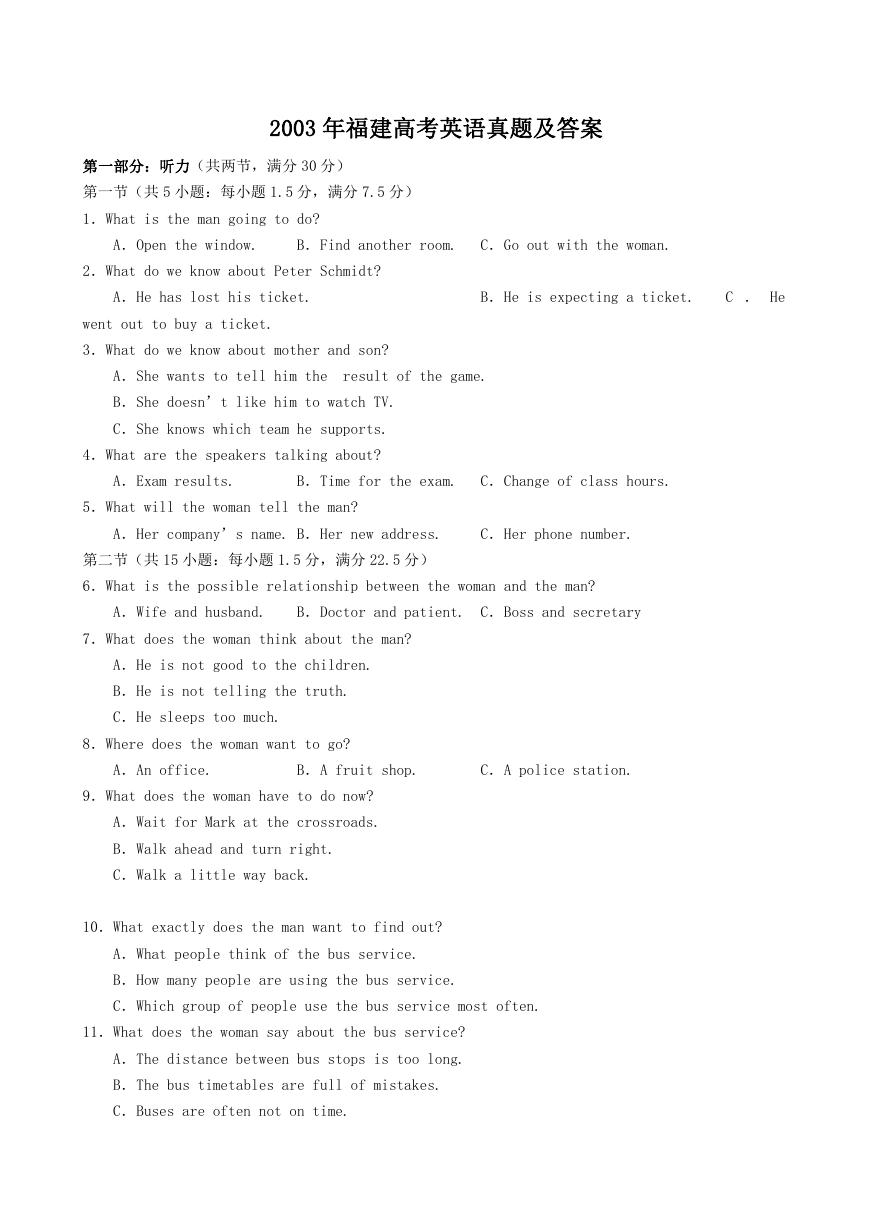

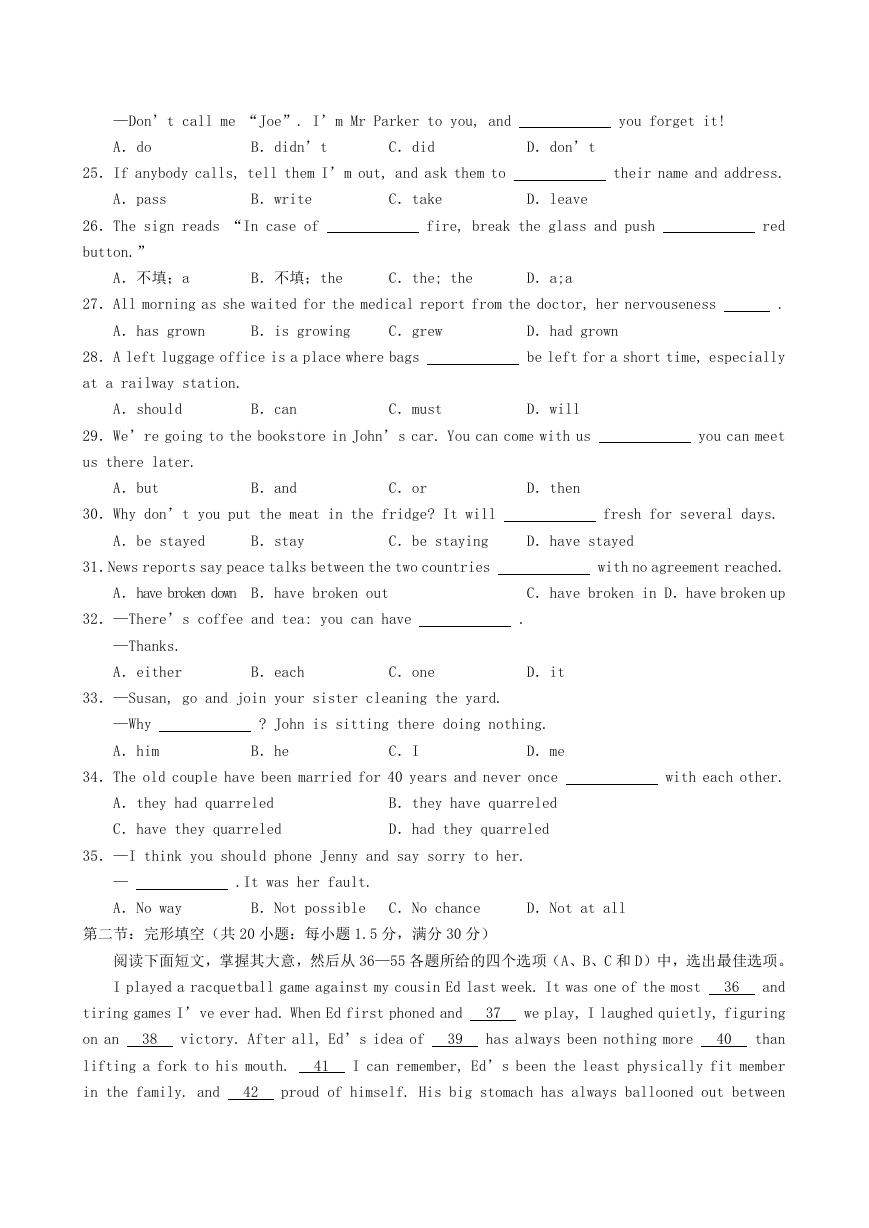
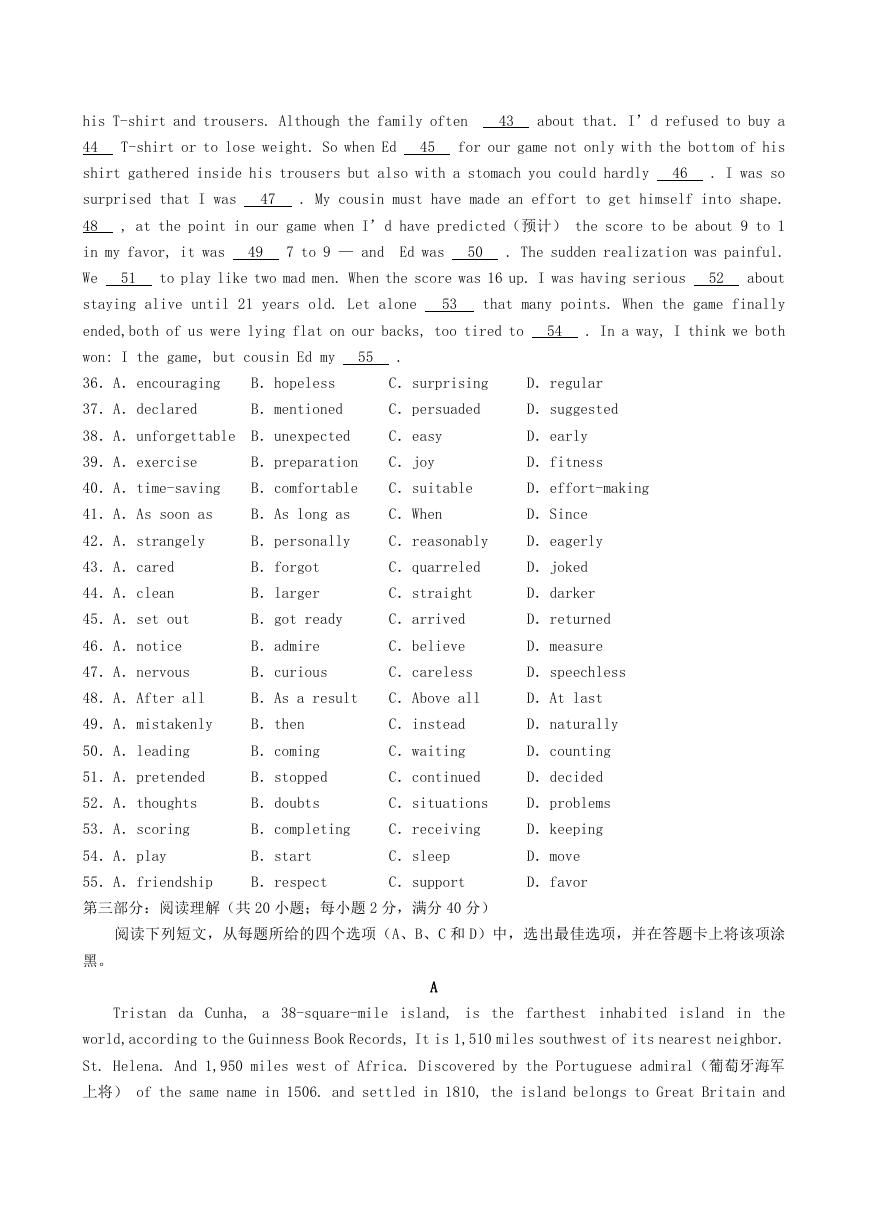
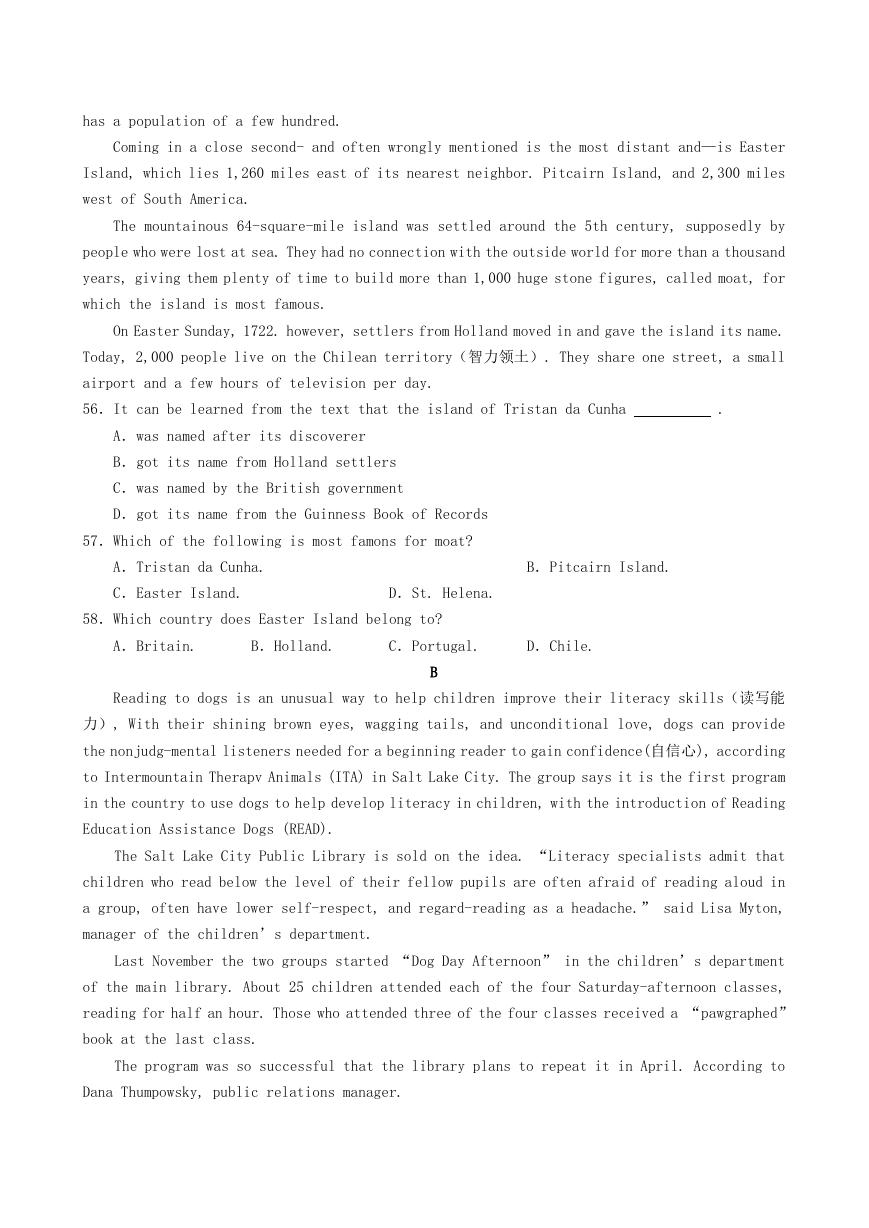
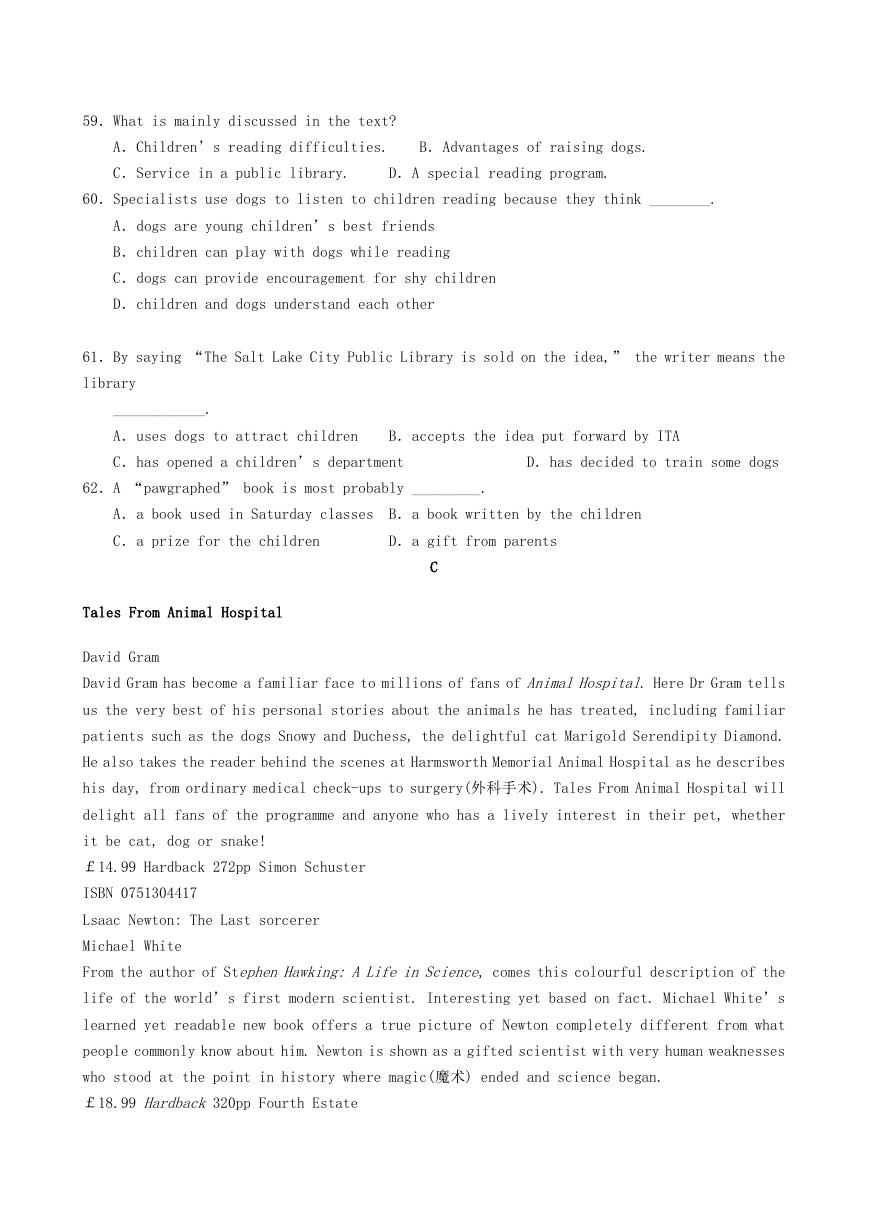










 2023年江西萍乡中考道德与法治真题及答案.doc
2023年江西萍乡中考道德与法治真题及答案.doc 2012年重庆南川中考生物真题及答案.doc
2012年重庆南川中考生物真题及答案.doc 2013年江西师范大学地理学综合及文艺理论基础考研真题.doc
2013年江西师范大学地理学综合及文艺理论基础考研真题.doc 2020年四川甘孜小升初语文真题及答案I卷.doc
2020年四川甘孜小升初语文真题及答案I卷.doc 2020年注册岩土工程师专业基础考试真题及答案.doc
2020年注册岩土工程师专业基础考试真题及答案.doc 2023-2024学年福建省厦门市九年级上学期数学月考试题及答案.doc
2023-2024学年福建省厦门市九年级上学期数学月考试题及答案.doc 2021-2022学年辽宁省沈阳市大东区九年级上学期语文期末试题及答案.doc
2021-2022学年辽宁省沈阳市大东区九年级上学期语文期末试题及答案.doc 2022-2023学年北京东城区初三第一学期物理期末试卷及答案.doc
2022-2023学年北京东城区初三第一学期物理期末试卷及答案.doc 2018上半年江西教师资格初中地理学科知识与教学能力真题及答案.doc
2018上半年江西教师资格初中地理学科知识与教学能力真题及答案.doc 2012年河北国家公务员申论考试真题及答案-省级.doc
2012年河北国家公务员申论考试真题及答案-省级.doc 2020-2021学年江苏省扬州市江都区邵樊片九年级上学期数学第一次质量检测试题及答案.doc
2020-2021学年江苏省扬州市江都区邵樊片九年级上学期数学第一次质量检测试题及答案.doc 2022下半年黑龙江教师资格证中学综合素质真题及答案.doc
2022下半年黑龙江教师资格证中学综合素质真题及答案.doc